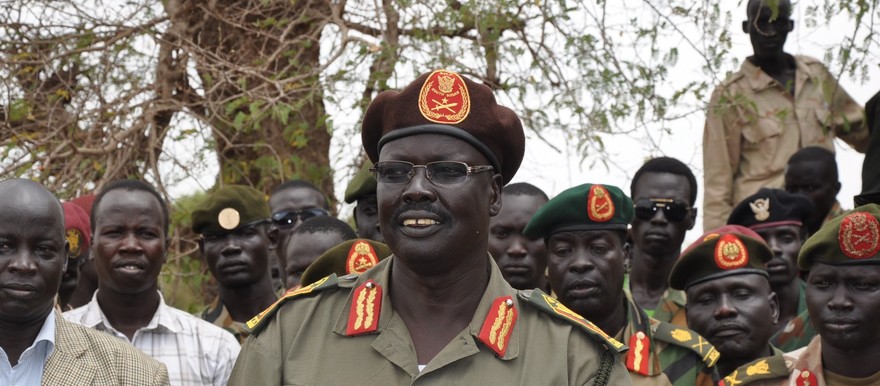Ex-rebels of South Sudan Liberation Army (SSLA) led by Bapiny Monytuil in Unity State who have responded to South Sudan President Salva Kiir’s calls for amnesty strongly denied allegations by the Warrap State government that they are a ‘direct security threat’ to the state.
The deputy governor of Warrap State, Akec Tong Aleu, three days ago charged that the armed group led by Bapiny Monytuil in Unity State have lent their support to inter-state cattle raids into Twic County. He suggested that the types of weapons and ammunition used by the raiders were available only to a more organized group such as the former rebel force.
Aleu spoke at the Freedom Square in Kwajok, capital of Warrap State, during celebrations on Thursday for the 30th anniversary of the Sudan People’s Liberation Army (SPLA). He was speaking in place of the governor who was away participating in a conference in Wau.
In an exclusive interview, SSLA’s second-in-command Karlo Kuol Rech, denied in strong terms the allegation made against his men and said that it is without concrete evidence and lacks credibility. “I want to say that what the deputy governor of Warrap State said is not true, it is an allegation that comes without evidence – it is baseless and not true,” said Gen. Karlo Kuol Rech.
Kuol disclosed to Radio Tamazuj that the SSLA forces in Mayom County of Unity State are staying near SPLA forces and said that it is not possibile for them to get into contact with the civilians. “What they say is far from reality,” he noted.
He explained that between his group in Mayom and the SPLA is a distance of of about five minutes walk. “A distance between us and the SPLA forces is five minutes, so if there is any allegation of our forces moving to Warrap State or causing insecurity between the states it is not true – I condemned such an allegation,” said the general.
The commander further said that before he came to Juba, he had a meeting with his forces and left them with the operational commander “with full instructions” for how to conduct themselves. “I spoke to the forces before I left for Juba,” he added.
The general urged the deputy governor of Warrap to stop such false allegations against his men, because they have come for peace: “If the deputy governor started with such bad signs I ask him to better to stop or refrain from giving baseless allegation against SSLA forces,” he said.
He also claimed that his group had had opportunity to raid cattle before — whilst en route from South Kordofan to Mayom they encountered a group of raiders returning with cattle from Warrap — but they passed up on the opportunity and even made the raiders return the cattle. He added that if they want to go to Warrap State they can do so and nothing can stop them, but he affirmed that now people are for peace and a spirit of peace must prevail in the hearts of the people.
“If security between the two states has gone bad, it should not be blamed on the presence of the SSLA in Mayom. Insecurity has been there even before we came,” he explained.
He also pointed out that an intra-tribal conflict took place recently within Unity State between the Bul Nuer of Mayom and the Jagei Nuer of Koch County. Citing this example, he said that the civilians involved were responsible, not the SSLA forces.
The general said that if Warrap has a problem with Unity State, they should not involve SSLA in their conflict because for them they came to make peace but not to cause conflict among the citizens of South Sudan.
“If you have problem with Unity State do not make us part of your problem – we came with the contact from the Government of South Sudan to make peace but not to make conflict,” he said.
The top SSLA general concluded that this is the time that the people of South Sudan from the citizens to all levels of government should proclaim the message of peace. He pointed out that South Sudan needs peace, stability and unity of all its peoples.
This is the first of a three-part interview.
File photo: Karlo Kuol Rech (Radio Tamazuj)




